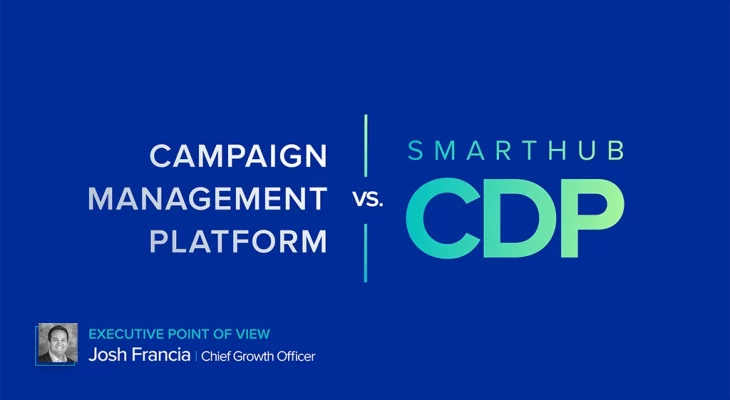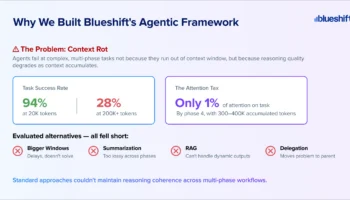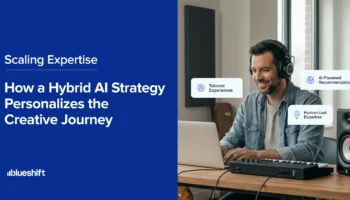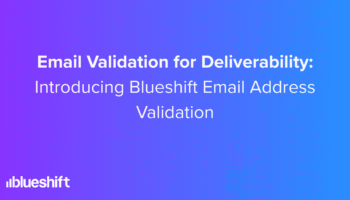Traditional single-channel marketing platforms for email or mobile campaigns have started to morph into cross-channel campaign management platforms that offer support for both channels. At the same time, a subcategory of customer data platforms (CDPs), called SmartHub CDPs, offer the functionality of a CDP with cross-channel campaign management capabilities. Below, we’ll explore the differences between a cross-channel campaign management platform — such as Braze or Iterable — and a SmartHub CDP like Blueshift.
Cross-Channel Campaign Management Platform vs. SmartHub CDP

CROSS-CHANNEL CAMPAIGN MANAGEMENT PLATFORMS
Why They Don’t Measure Up
Cross-channel campaign management platforms do three main things:
- Ingest customer data records and store them in static data tables.
- Build and personalize marketing templates, usually in email and mobile.
- Orchestrate and automate customer journeys on a 1:1 level across email and mobile marketing channels.
Cross-channel campaign management platforms activate customers based on an incomplete view of the customer. They are limited to channel-level data to decide next best actions and don’t see the full view of the customer profile from other touchpoints. Additionally, they only activate the customer experience across a limited set of marketing channels (mostly email and mobile) but miss out on activating across additional marketing channels, like paid media, and other customer experience channels, like support, commerce, sales, etc.
As such, many cross-channel campaign management platforms require you to purchase a traditional customer data platform in order to get the full customer view and be able to connect beyond marketing channels. They are like computers without a hard drive.
SMARTHUB CUSTOMER DATA PLATFORMS
What Gives Us an Edge
SmartHub CDPs do all the same things as cross-channel campaign management platforms with the addition of four more important CDP-focused features:
- Resolve anonymous and known identities into unique customer profiles and provide a full 360 view of the customer from all ingestion sources.
- Provide predictive scores, which consist of standard out-of-the-box and configurable options across segments.
- Segment and push audience data to various destinations, including paid media platforms and other customer experience channels like support, commerce, IVR, and sales.
- Upload and manage product and content catalog data, as well as build recommendations based on customer behavior and predictive affinities.
Essentially, SmartHub CDPs combine a customer data platform and a cross-channel campaign management platform into a single platform, allowing companies to have a complete view of their customers and activate them all in one place, so you don’t need to purchase a standalone CDP. This helps companies consolidate their martech stacks, reduce cost, and drive increased efficiencies.
Of course, companies can choose a cross-channel campaign management platform and a traditional CDP — and that can work, but it is a significantly inferior choice to a combined offering (a.k.a., a SmartHub CDP).
Because all customer data and orchestration is in one place, a SmartHub Customer Data Platform further helps companies in the following ways:
- Enables the ability to react in real time to events instead of having delays when pushing from system to system.
- Maintains data fidelity since data doesn’t need to be translated from system to system.
Saves approximately 30 to 50 hours per week across marketing teams who are able to work faster and more efficiently. - Reduces costs associated with paying for two separate systems and maintaining the necessary connections and data flows.
- Provides a single place for consent management and compliance across all channels (email, push, SMS, etc.) and legislation (CAN-SPAM, GDPR, CCPA, etc.).
Companies are eager to consolidate their bloated martech stacks to drive higher efficiencies and increased revenue. A SmartHub Customer Data Platform like Blueshift helps marketers like you do just that.
Schedule a demo with a Blueshift expert today to learn more about what sets our SmartHub CDP apart.


